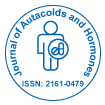Research Article
Effects of 5HT2c Blockade of Dibenzodiazepines on Thyroid Levels in Patients with Schizophrenia or Schizoaffective Disorder
| Shankar GS1 * and Carol Yuan2 | ||
| 1Associate Professor of Pharmacy, Clinical Psychopharmacology, Western University of Health Sciences, CA 91766, USA | ||
| 2Clinical Assistant Professor of Pharmacy Practice-Ambulatory Care in Psychiatric Pharmacotherapy and Pharmacy Director, Aurora Charter Oak Behavioral Health, Covina, CA, USA | ||
| Corresponding Author : | Shankar GS Associate Professor of Pharmacy, Clinical Psychopharmacology Western University of Health Sciences, CA 91766, USA E-mail: GShankar@westernu.edu |
|
| Received February 12, 2013; Accepted June 12, 2013; Published June 14, 2013 | ||
| Citation: Shankar GS, Yuan C (2013) Effects of 5HT2c Blockade of Dibenzodiazepines on Thyroid Levels in Patients with Schizophrenia or Schizoaffective Disorder. Autacoids 2:102. doi: 10.4172/2161-0479.1000102 | ||
| Copyright: © 2013 Shankar GS, et al. This is an open-access article distributed under the terms of the Creative Commons Attribution License, which permits unrestricted use, distribution, and reproduction in any medium, provided the original author and source are credited. | ||
Related article at Pubmed Pubmed  Scholar Google Scholar Google |
||
Abstract
Drug-induced hypothyroidism has been often observed with the use of lithium in patients with mental disorders. However, atypical antipsychotic medications, especially those with serotonin 2c (5HT2c) blockade like dibenzodiazepines have not been examined for their association with the occurrence of subclinical hypothyroidism. Atypical antipsychotic medications are commonly used in patients with psychiatric disorders, specifically in schizophrenia and schizoaffective disorders. The objective of this retrospective case analysis is to examine the thyroid function of patients with schizophrenia or schizoaffective disorder receiving dibenzodiazepines. This study includes patients that are on one or more of these atypical anti-psychotic agents: clozapine, olanzapine, quetiapine. Clinical outcome measured includes the effect on dibenzodiazepines on thyroid function (e.g. TSH, Free T4, and T4).
A total of 42 charts of the patients were included in the study. Out of the 42 patients, 13 had normal thyroid labs, 11 had abnormal thyroid labs, and 18 patients had a diagnosis of hypothyroidism, and currently on a thyroid medication. Therefore, 31% of these patients were found to have normal thyroid levels, while 69% of these patients were found to have either slightly abnormal thyroid indices (subclinical hypothyroidism), or an impairment of thyroid function.
The results of our study show that in patients with schizophrenia or schizoaffective disorder that are on clozapine, olanzapine, quetiapine, or any combination of the four, a higher percentage of them exhibited abnormal thyroid function with subclinical hypothyroidism, or on thyroid supplements. Future studies may be warranted to further evaluate the effect of antipsychotics with 5HT2c blockade on thyroid function.

 Spanish
Spanish  Chinese
Chinese  Russian
Russian  German
German  French
French  Japanese
Japanese  Portuguese
Portuguese  Hindi
Hindi